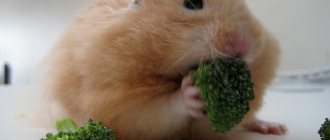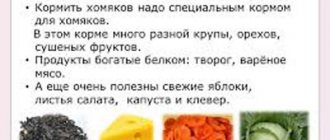What are the benefits of tomatoes for a hamster?
Hamsters, like any living creature, need vitamins. Tomatoes will help make up for the deficiency of the following:
| Vitamins | Why are they needed? |
| C (ascorbic acid) | Participates in the synthesis of hormones, protein metabolism, helps fight infections, improves immunity |
| A (retinol) | Promotes wound healing, tissue regeneration, has a beneficial effect on the health of the eyes, respiratory, digestive, and urinary systems |
| E (tocopherol) | Helps cell restoration, protects them (especially nerve cells), participates in the process of hematopoiesis |
| Group B | Necessary for the functioning of all body systems, primarily the nervous and cardiovascular systems, support metabolism (energy metabolism) |
In addition, vitamins and lycopene have a pronounced antioxidant effect, that is, they are able to protect the animal’s body from the effects of free radicals and protect against cancer.
Hamster and tomatoes
Minerals contained in tomatoes contribute to normal metabolism, in particular hormonal metabolism, strengthening blood vessels and the skeleton:
- calcium and phosphorus are included in connective and bone tissues, in the composition of claws and teeth;
- iodine is necessary for the functioning of the thyroid gland;
- potassium and magnesium are involved in the transmission of nerve impulses to muscles (including the heart).
Tomatoes also contain organic acids (malic, citric), which are necessary for good digestion. Fiber, which is found in large quantities in tomatoes, also contributes to the efficient functioning of the gastrointestinal tract.
Feeding recommendations
It is enough for an adult to feed a tomato once or twice a week, while limiting the amount to 20-30 g per day. Do not give tomatoes to babies or pregnant or lactating females. Eating too much can lead to severe diarrhea, which can lead to dehydration and death.
Don't forget that clean drinking water should always be in your pet's cage. The product contains a large amount of liquid, but is not able to quench thirst.
If the hamster refuses tomato, in this case, do not force it. A rodent knows best what is good for it and what is not.
It is recommended to feed the rodent tomatoes in the morning, and give dry food in the evening. A hamster is a gloomy animal; at night it must consume a large amount of carbohydrates, and in the morning receive a light breakfast rich in vitamins.
If it is not possible to feed your hamster fruits from your garden, then peel the skin off the purchased ones. As you know, it contains the largest amount of harmful substances.
Remember, hamsters love to store food for future use. Keep an eye on this and always throw away any remaining food hidden there from the cage. Spoiled food can cause severe poisoning and death of your pet.
So, is it possible to give hamsters tomatoes? – Yes, but in reasonable quantities.
Inexperienced owners, worried about their little pet, are afraid to introduce new products into the animal’s diet. To resolve all doubts, we will analyze in detail whether hamsters can eat tomatoes. Let's look at the benefits of this product and in what quantities it is best to consume it.
Should you include tomatoes in your hamster's diet?
Considering that the vegetable is so rich in nutrients, experts advise offering it to hamsters, but contraindications must also be taken into account:
- there may be manifestations of allergic reactions;
- if digestive disorders have been observed, they may increase (diarrhea, flatulence, dehydration);
- joint diseases, pancreatitis, gout, if the pet has them, are aggravated.
Hamster and cherry tomato
Tomatoes grown in your own garden are best suited. Greenhouse vegetables out of season should not be given to animals, as the fruits can absorb large amounts of nitrates, which are used for indoor cultivation. In any case, it is better to remove the skin from tomatoes, since it contains a higher content of harmful substances. Green nightshade fruits, which include tomatoes, contain poisonous solanine, so unripe vegetables are also not suitable for feeding hamsters.
In winter, it is even more impossible to replace fresh tomatoes with canned, salted and pickled ones. They contain too much salt and other preservatives (such as vinegar), which will create excessive stress on the digestive and excretory systems of rodents. Dried fruits, tomato paste and juices create a high concentration of acids, which is also harmful for hamsters.
A good option for winter is to grow small cherry tomatoes on the windowsill.
Can a hamster treat itself to store-bought zucchini?
You need to be extremely careful when choosing store-bought vegetables. To ensure that plant products remain attractive longer, stores treat them with toxic chemicals. Food laced with chemicals can kill a small animal. It’s good if you have the opportunity to feed your pet zucchini, carrots, cucumbers, and sweet peppers grown with your own hands. But not all owners have summer cottages. You can stroll through the market and buy vegetables from the village grandmothers. Typically, rural residents do not overwater their gardens with pesticides, herbicides and other pesticides. As a last resort, you can process zucchini bought in a store: wash it thoroughly, cut off the peel in a thick layer.
How to feed?
Tomatoes should be introduced into the hamster’s menu gradually. Start literally with 5 grams, observing the pet’s further reaction. In case of negative manifestations (allergies, diarrhea), stop feeding. For clarity: the average size of a cherry fruit is 10 – 30 grams. This is exactly the one-time norm of tomato complementary feeding for an adult rodent. Giving tomatoes to your hamster 1 – 2 days a week will be enough.
Hamster eats tomato
Vegetable foods are easier on the animal's digestion than nutritious grain mixtures high in carbohydrates and proteins. And since hamsters are active at night, it is better to offer them tomatoes in the morning. In this case, it is necessary that there is a sufficient amount of water in the other bowl.
Pregnant and lactating females, as well as cubs, should not be given these vegetables; it is better to choose other vitamin supplements. Tomatoes should not be mixed with protein feed. If your pet refuses to eat vegetables, there is no need to insistently offer them; usually animals instinctively choose what is best for them.
Harmful properties
But tomatoes do not always have a positive effect on the health of the rodent. There are a number of contraindications in which consumption should either be limited or excluded from the rodent’s diet altogether. The product cannot be used in cases where:
- The hamster is prone to frequent stomach upsets (diarrhea, diarrhea). The disease is scary because it can lead to dehydration or rectal prolapse.
- Do not give simultaneously with foods high in protein. All together this leads to a slowdown in the digestion process and bloating and flatulence.
- Excluded from the diet if the animal is sick with arthritis or gout.
- Never feed your pet unripe vegetables. Green tomato contains dangerous poison. This type of poisoning can be fatal.
- If a rodent is sick with gastritis or pancreatitis, this is also a reason to exclude tomatoes from its diet.
- Do not feed the vegetable to Syrian hamsters. This type of rodent is susceptible to joint pathologies. And eating it can lead to an exacerbation of the disease.
- It may cause an allergic reaction because it contains dyes. When you treat your pet to this product for the first time, carefully monitor its condition. An allergy can manifest itself as watery eyes, shortness of breath, constant scratching of the skin, and redness on the skin. If this does not happen, you can safely feed him vegetables.
Is it possible to give hamsters tomatoes if they are salted or pickled? - Definitely not. They contain a large amount of salt, which is poorly excreted from the rodent's body. Its excess has a bad effect on the functioning of the cardiovascular system. And if a rodent suffers from kidney disease, then kidney stones may develop.
It is also not recommended to give hamsters vegetables bought in the supermarket in winter. Since there is a high probability that they contain large quantities of nitrates and pesticides. There is no need to give him tomato juice, because the concentration of acidity in it is much higher than in fruits, and the amount of liquid can immediately lead to diarrhea.
Benefits of vegetables
The energy value of the vegetable is low, since 95% of it consists of water. But the low calorie content (only 20 kcal per 100 g) does not in any way affect the presence of nutrients contained in the tomato. It contains micro- and macroelements: potassium, magnesium, phosphorus, chlorine, sodium, zinc, copper, manganese. Basic vitamins are also present in the vegetable: vitamin A, C, H. Let's consider how the chemical composition of a tomato has a beneficial effect on the overall health of the pet:
- Antioxidants prevent the growth and development of cancer cells.
- Vitamin C is especially necessary for the baby’s body during the period of vitamin deficiency, after an illness, and simply for the prevention of any colds in general.
- The fiber in the product has a beneficial effect on the functioning of the hamster's gastrointestinal tract. Helps reduce the risk of developing constipation.
- Acids (citric, malic, glycolic) improve appetite. A small amount of the vegetable will be especially useful for a hamster in the third or fourth year of life. It is during this period that they often refuse to eat.
- Positively affects the functioning of the rodent's cardiovascular system. Prevents the risk of thrombosis and atherosclerosis.
- Helps improve the animal's immunity and remove toxins from the body.
- Useful for hamsters suffering from diseases of the genitourinary system - cystitis, pyelonephritis. Folic acid normalizes the water-salt balance in the animal’s body and removes excess fluid and toxins. Responsible for increasing and maintaining immunity.
- Vitamins have a positive effect on the appearance of the rodent’s fur. They make it silky and shiny.
- Iodine normalizes the functioning of the endocrine system and promotes the normal functioning of the thyroid gland.
- Regular consumption of this product normalizes metabolism and avoids diseases of the nervous system.
- For constipation, tomato can be given instead of a laxative. It will help the intestines to empty easily and normalize the functioning of the gastrointestinal tract.
What do we have as a result?
Can hamsters eat tomatoes? Can! But only fresh, not canned. Better grown on your own plot. You can give it to both Syrian and Djungarian hamsters. But the Syrians are a little less likely. Wash the fruit itself well, it is better to remove the skin. Introduce into the diet in small portions and observe the pet’s reaction.
source
The health of your pet largely depends on proper nutrition. The basis of a hamster's diet is cereals. But grains and cereals do not contain all the substances necessary for the development and normal functioning of an animal, so vegetables and fruits have to be included in its menu. A large number of vitamins, micro- and macroelements are present in tomatoes.
Can Syrian hamsters and dwarfs eat tomatoes?
Another negative point is that tomatoes are not recommended for those with joint problems. And Syrians are prone to arthritis. Hence the conclusion: Syrian hamsters should not be given tomatoes. Or very rarely and in small pieces. With dzhungariki everything is a little simpler, there the situation is like with a pear - they gave a piece and saw what happens. If everything is in order, we feed the Djungarian hamster with tomatoes without any special worries.
If I don’t eat it all at once, I’ll at least take a bite!











